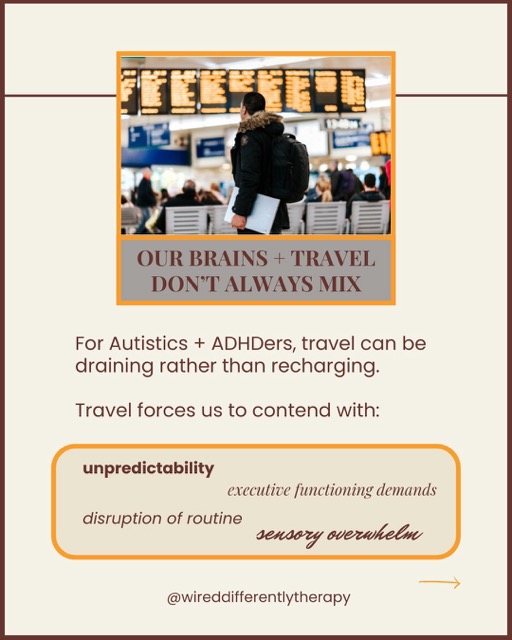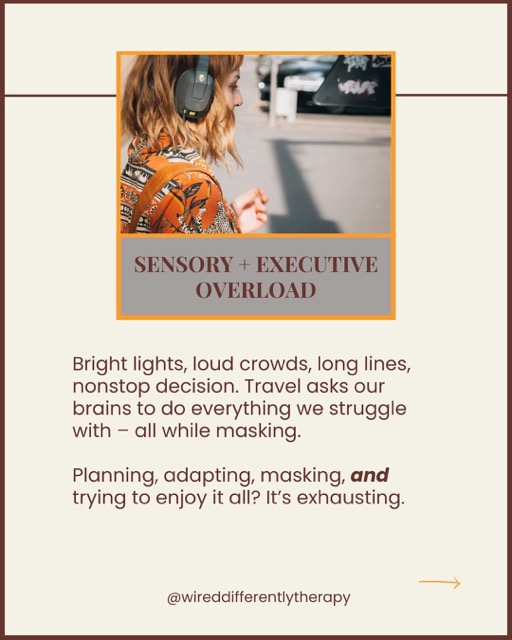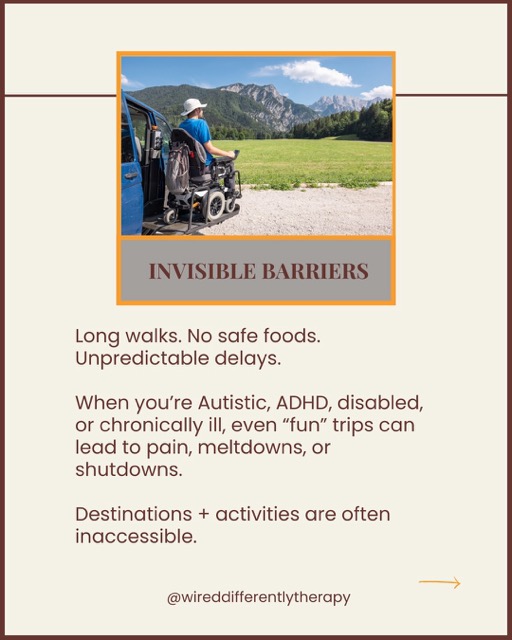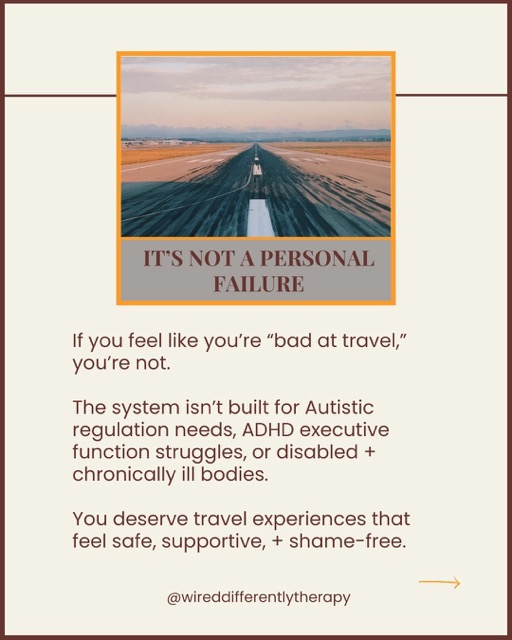Why Travel Isn’t Always a Vacation for Autistic + ADHD People
If you’re Autistic, ADHD, or AuDHD (like me), you may wonder why travel often feels so overwhelming, even when it’s something you're excited about. While many people see travel as a joyful escape, those of us with Autistic and ADHD brains often experience it as a sensory, logistical, and emotional obstacle course.
You’re not imagining it. Travel demands exactly the things our brains and bodies tend to struggle with: unpredictability, overstimulation, executive function overload, and inaccessible systems. For those of us who are also chronically ill or experience mobility limitations, the barriers multiply.

Unpredictability Feels Unsafe
For many Autistic people, predictability and routine are grounding. Travel, by nature, is full of uncertainty: delayed flights, last-minute itinerary changes, unfamiliar environments, different food, new routines. Sometimes all it takes is a sudden gate change or a broken in-flight entertainment screen to send me into a panic.
For ADHDers, shifting stimuli can either be thrilling or deeply dysregulating, especially when combined with time-sensitive decisions, planning fatigue, or jet lag.
How early should I get to the airport to avoid stress without sitting there for four hours? What if security is an issue? What if my bag gets lost, or I can't find safe foods? What if I don’t sleep and can’t function? These ruminations can activate our nervous systems before we even walk out the door.
Transitioning In and Out of Travel Mode
Even if the trip itself goes well, transitioning into travel mode (preparing, packing, anticipating sensory and social overwhelm) and then back into everyday life can be disorienting. Many Autistic people and ADHDers need time to shift gears and recover from changes to routine and environment.
I block out several “transition days” before and after travel. I treat them as recovery time, not free time — and Iower my expectations accordingly.

Sensory Overload Everywhere All At Once
Airports, buses, train stations, and travel destinations bombard the senses: loud noises, crowds, bright lights, uncomfortable seating, strange smells. Autistic and ADHD folks may struggle to filter input, which can lead to meltdowns, shutdowns, or general overwhelm.
Crowds often press forward to board flights and buses, with no regard for personal space. That close-proximity chaos can feel unbearable when your sensory system is already overloaded.
I travel in comfy clothes, with noise-canceling headphones, sunglasses, stim toys, and safe snacks. These aren’t negotiable – they’re access needs.
Executive Function Overload
Planning a trip involves endless details: booking, packing, budgeting, navigating, and adjusting on the fly. Decision paralysis can make it feel impossible to even start planning. These executive functioning demands can be overwhelming for ADHDers with time blindness and working memory challenges, and dysregulating for Autistic people who rely on routine and preparation.
I used to think I was “bad at travel.” Now I know it just wasn’t designed with brains like mine in mind.

Disability + Chronic Illness = Extra Barriers
For those of us with chronic illness or physical disability, travel often adds a layer of risk and vulnerability. Long walks, poor sleep, disrupted routines, and inaccessible environments can cause flare-ups, pain, or extreme fatigue.
I’ve often been left waiting for a wheelchair at the gate or stuck on the plane until someone could assist me. The combination of physical pain, exhaustion, and unpredictability has triggered meltdowns in airport terminals.
Even when you arrive, many destinations are physically inaccessible. Historical sites, nature trails, and “bucket list” attractions often have stairs, uneven ground, or limited to no seating. Activities like guided tours or adventure excursions are typically designed for able-bodied travelers, leaving disabled people excluded or expected to push past their limits.
This is a systemic issue—not a personal failure.
Social Norms + Masking pressure
Traveling to new places often means decoding unfamiliar social norms and expectations. For Autistic people, navigating small talk, politeness rules, and body language cues can be exhausting. Add in the need to self-advocate — sometimes in public, in a different language, or while under stress — and anxiety builds fast.
Using mobility aids or requesting accommodations can also draw unwanted attention, stares, or disbelief. For high-masking folks, travel can amplify that pressure and emotional cost.
Losing access to Support Systems
At home, many of us rely on routines, sensory-friendly spaces, safe foods, pets, therapists, and trusted people. Traveling removes many of those supports, and that loss can lead to shutdowns and meltdowns.
When I travel now, I don’t “push through.” I build in rest, say no more often, and remind myself that I don’t have to do it all.

Internalized Shame Makes It Worse
Many of us have internalized the belief that travel is supposed to be joyful and relaxing. When it’s not, we feel like we’re failing. Parents of Autistic or ADHD children may also feel guilty when their child struggles during a trip. But the truth is: most travel systems were not built with our bodies or brains in mind.
You’re not difficult. You’re navigating environments that ignore your needs—and doing it with extraordinary effort.
What can Help?
- Build in downtime — during and after travel.
- Pack your access tools (and bring extras): noise-cancelling headphones, meds, mobility aids, fidgets, etc.
- Use visual checklists and flexible plans.
- Choose quiet lodging and accommodations with flexible cancellation options.
- Confirm accessibility in advance (don’t rely on generic “ADA-compliant” language).
- Practice scripts for self-advocacy.
- Travel with people who respect and understand your needs.
- Opt out when needed. You don’t have to push through.
There is Movement Toward Change
While much of the travel world still lags behind, some efforts are emerging. Programs like The Arc’s Wings for All® provide practice runs through airports for Autistic and disabled travelers. Some airports now offer sensory rooms, clearer signage, and staff training to better support us. It’s not perfect, but it’s a start.
Final Thoughts
Whether you travel often or never leave your zip code, you deserve to feel safe, supported, and unashamed.
Travel can be meaningful and fulfilling but only when our needs are honored from the start. You don’t need to earn your rest. You don’t have to justify your access tools. And you don’t owe anyone a “resilient” version of yourself.
Need help understanding your access needs or navigating internalized shame? I offer neurodiversity-affirming therapy for Autistic and ADHD adults.
.png)